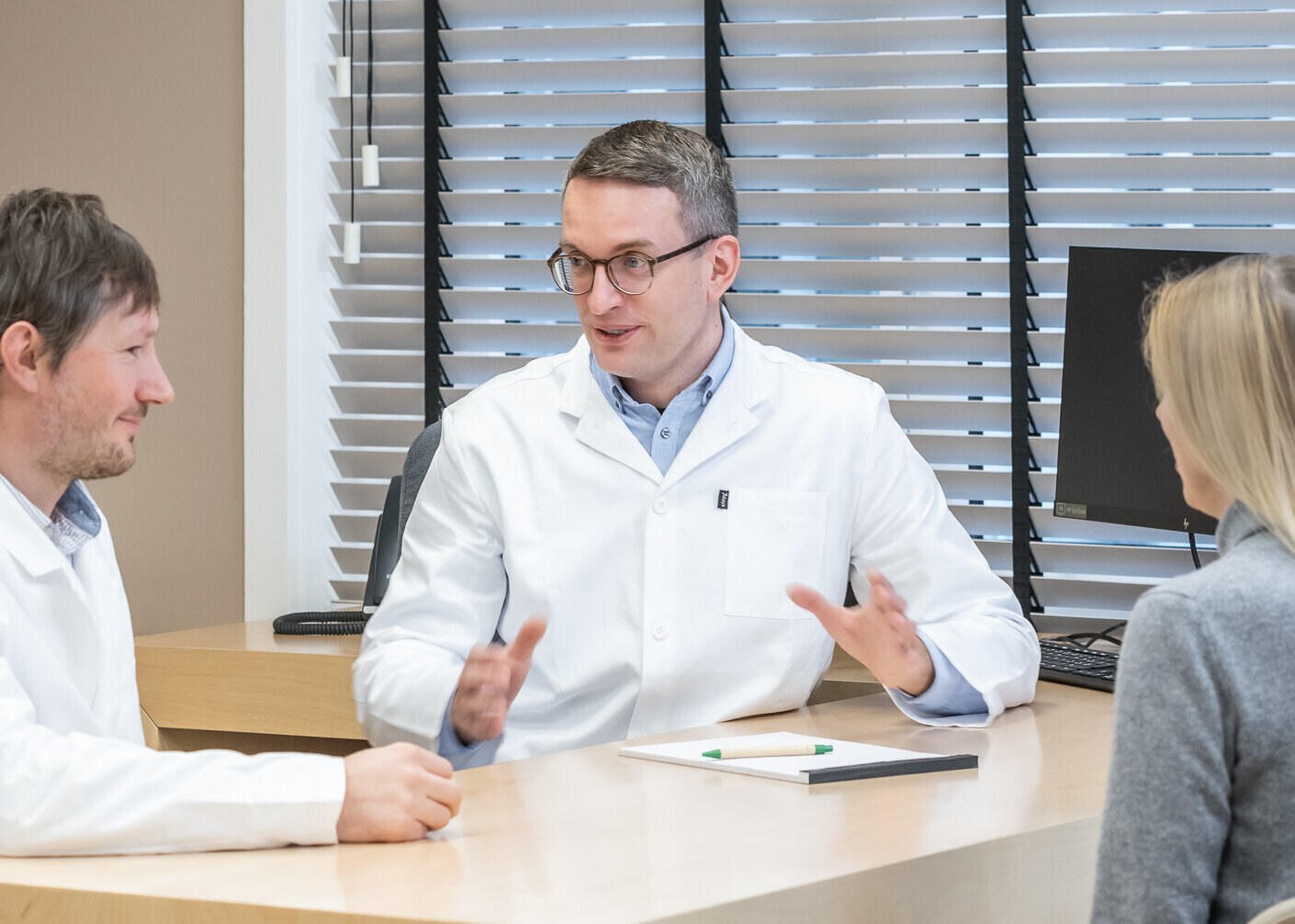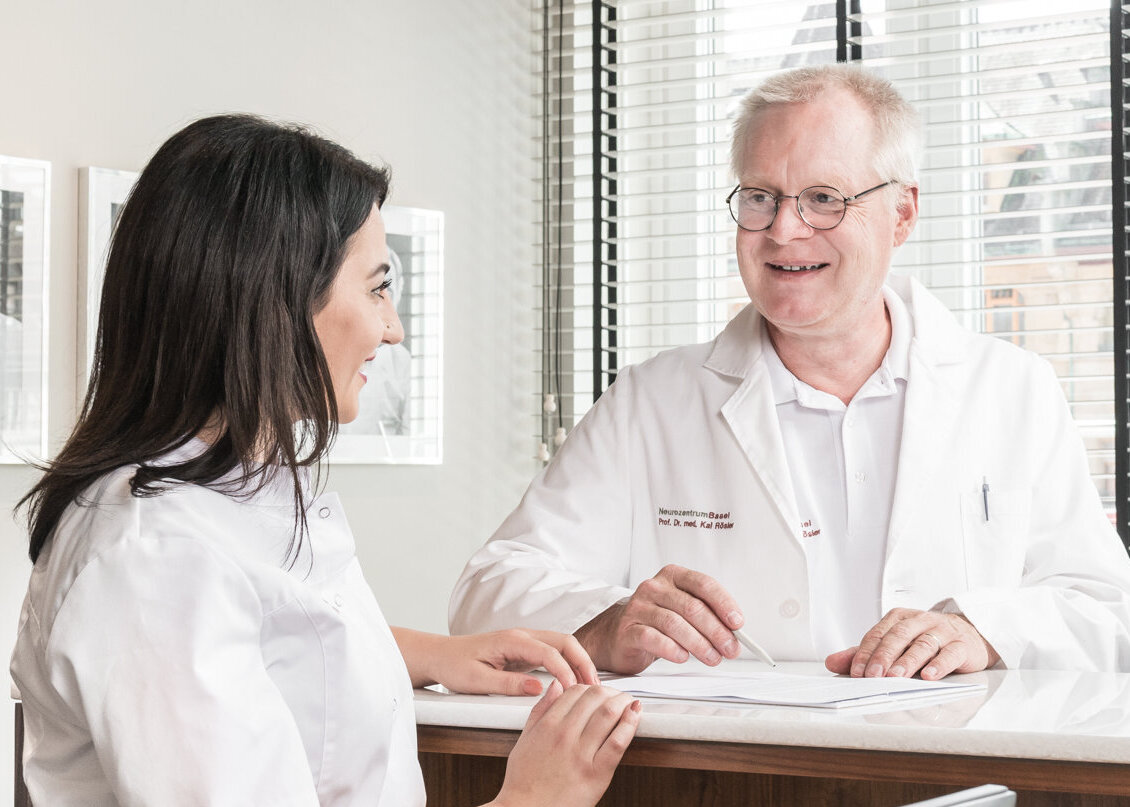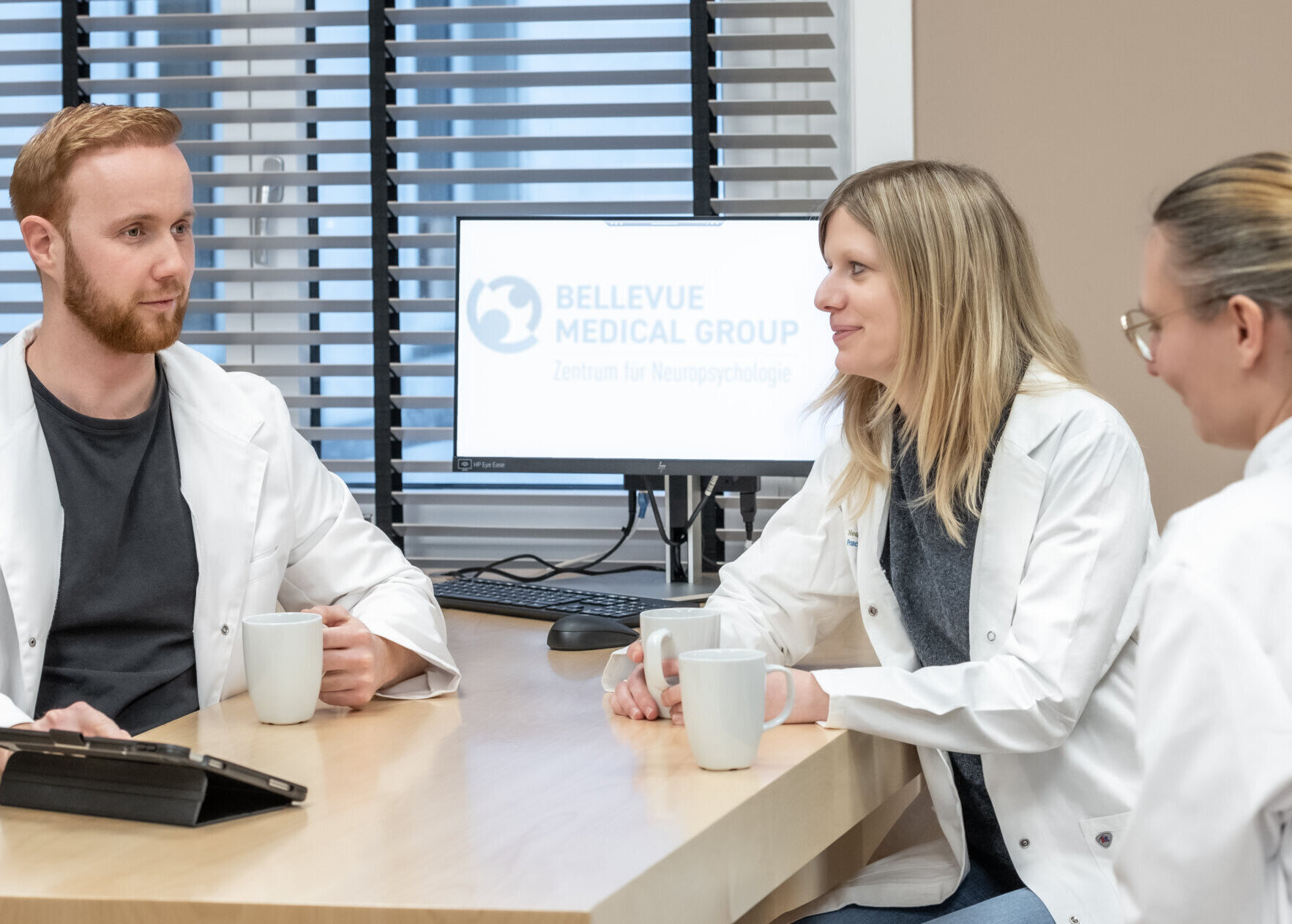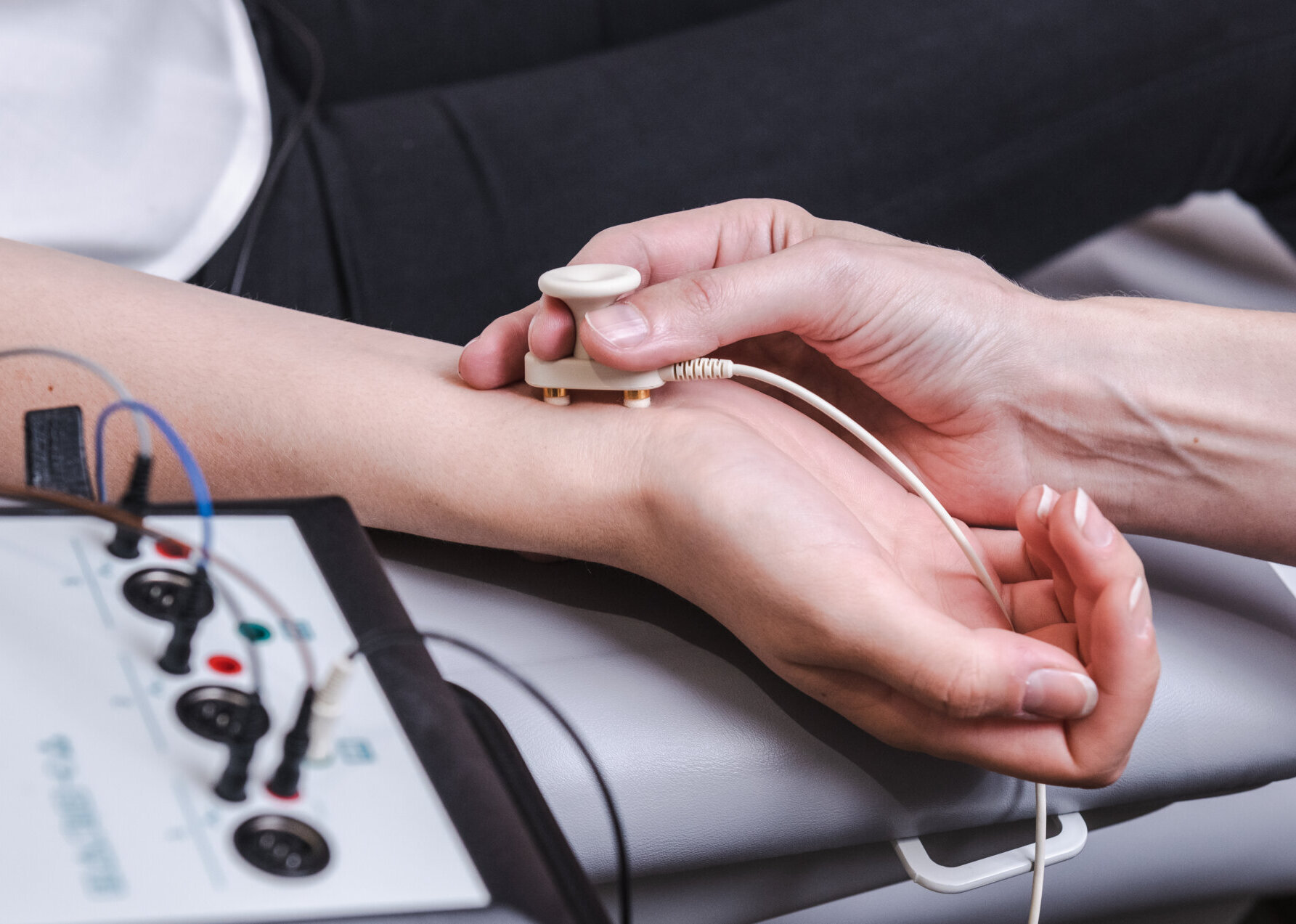Das Neurozentrum Basel ist ein interdisziplinär tätiges Kompetenzzentrum für Neurologie, Neuropsychologie und Neurochirurgie.
Als neurologisch geführtes Facharztzentrum sind wir spezialisiert auf die Diagnostik und Behandlung von Krankheiten des zentralen und peripheren Nervensystems und decken dabei das Spektrum der neurologischen Erkrankungen gesamthaft ab. Dazu gehören Multiple Sklerose und andere entzündliche Hirnerkrankungen, Schlaganfall, Epilepsie, Bewegungsstörungen, Demenzen, Kopfschmerzen, Schwindel, Rückenmarkserkrankungen, Polyneuropathien und andere Krankheiten der peripheren Nerven. Wir bieten eine zeitnahe und umfassende Abklärung und Behandlung bei akuten Beschwerden und eine kontinuierliche und persönliche medizinische Betreuung bei chronischen Erkrankungen an. Ein direkter und enger Austausch mit unseren ZuweiserInnen, HausärztInnen und KollegInnen anderer Fachdisziplinen ist uns wichtig.
Unser Standort ist zentral im Messeturm in Basel im 18. OG und für alle PatientInnen – auch mit Einschränkungen der Mobilität – bequem erreichbar. Unsere Patientinnen und Patienten profitieren von einer persönlichen und fachlich erstklassigen medizinischen Betreuung.




In unseren interdisziplinären Spezialsprechstunden setzen wir auf moderne Diagnostik, individualisierte Therapien, persönliche und langjährige Betreuung. Wir arbeiten eng mit führenden Spezialisten der Neurochirurgie, Neuroradiologie, Neurourologie, Neurorehabilitation und Neuropsychologie zusammen.
Alle notwendigen Untersuchungen führen wir in der Regel ambulant und innerhalb weniger Tage durch.
Wir sind für Sie da
Administrative Leiterin Region West
Albulena Dzemaili
Leitung Neurophysiologie
Anne Krüger
Arztsekretärin / MPA
Madura Sivasubramaniam
Zelal Ger
Enise Dermaku
Tamara Meyer
Informationsbroschüren
Montag bis Freitag
08:00 – 12:00 Uhr und 13:00 – 17:00 Uhr
Messeturm, 18. OG
Messeplatz 10
4058 Basel
neurozentrumbasel@hin.ch
+41 61 205 29 50
via Google Tag Manager
Beim Besuch dieser Website werden personenbezogene Daten verarbeitet. Dabei verarbeitete Datenkategorien: technische Verbindungsdaten des Serverzugriffs (IP-Adresse, Datum, Uhrzeit, abgefragte Seite, Browser-Informationen). Zweck der Verarbeitung: Auslösung, Steuerung und Verwaltung weiterer Dienste unserer Website. Die Rechtsgrundlage für die Verarbeitung: ein berechtigtes Interesse, das die Rechte und Freiheiten der betroffenen Personen überwiegt (Art. 6 (1) f DSGVO). Berechtigte Interessen in diesem Zusammenhang: starkes wirtschaftliches Interesse an einem sicheren und funktionierenden Betrieb der technischen Systeme, Einhaltung von gesetzlichen und vertraglichen Pflichten. Eine Übermittlung von Daten erfolgt: an den Auftragsverarbeiter Google Ireland Limited, Gordon House, Barrow Street, Dublin 4, Irland. Dies kann auch eine Übermittlung von personenbezogenen Daten in ein Land außerhalb der Europäischen Union bedeuten. Die Übermittlung der Daten in die USA erfolgt aufgrund Art. 45 DSGVO iVm der Angemessenheitsentscheidung C(2023) 4745 der Europäischen Kommission, da sich der Datenempfänger zur Einhaltung der Grundsätze der Datenverarbeitung des Data Pricacy Frameworks (DPF) verpflichtet hat.
via Google Tag Manager
Beim Besuch dieser Website werden personenbezogene Daten verarbeitet. Dabei verarbeitete Datenkategorien: technische Verbindungsdaten des Serverzugriffs (IP-Adresse, Datum, Uhrzeit, abgefragte Seite, Browser-Informationen). Zweck der Verarbeitung: Auslösung, Steuerung und Verwaltung weiterer Dienste unserer Website. Die Rechtsgrundlage für die Verarbeitung: ein berechtigtes Interesse, das die Rechte und Freiheiten der betroffenen Personen überwiegt (Art. 6 (1) f DSGVO). Berechtigte Interessen in diesem Zusammenhang: starkes wirtschaftliches Interesse an einem sicheren und funktionierenden Betrieb der technischen Systeme, Einhaltung von gesetzlichen und vertraglichen Pflichten. Eine Übermittlung von Daten erfolgt: an den Auftragsverarbeiter Google Ireland Limited, Gordon House, Barrow Street, Dublin 4, Irland. Dies kann auch eine Übermittlung von personenbezogenen Daten in ein Land außerhalb der Europäischen Union bedeuten. Die Übermittlung der Daten in die USA erfolgt aufgrund Art. 45 DSGVO iVm der Angemessenheitsentscheidung C(2023) 4745 der Europäischen Kommission, da sich der Datenempfänger zur Einhaltung der Grundsätze der Datenverarbeitung des Data Pricacy Frameworks (DPF) verpflichtet hat.
via Google Tag Manager
Beim Besuch dieser Website werden personenbezogene Daten verarbeitet. Dabei verarbeitete Datenkategorien: technische Verbindungsdaten des Serverzugriffs (IP-Adresse, Datum, Uhrzeit, abgefragte Seite, Browser-Informationen). Zweck der Verarbeitung: Auslösung, Steuerung und Verwaltung weiterer Dienste unserer Website. Die Rechtsgrundlage für die Verarbeitung: ein berechtigtes Interesse, das die Rechte und Freiheiten der betroffenen Personen überwiegt (Art. 6 (1) f DSGVO). Berechtigte Interessen in diesem Zusammenhang: starkes wirtschaftliches Interesse an einem sicheren und funktionierenden Betrieb der technischen Systeme, Einhaltung von gesetzlichen und vertraglichen Pflichten. Eine Übermittlung von Daten erfolgt: an den Auftragsverarbeiter Google Ireland Limited, Gordon House, Barrow Street, Dublin 4, Irland. Dies kann auch eine Übermittlung von personenbezogenen Daten in ein Land außerhalb der Europäischen Union bedeuten. Die Übermittlung der Daten in die USA erfolgt aufgrund Art. 45 DSGVO iVm der Angemessenheitsentscheidung C(2023) 4745 der Europäischen Kommission, da sich der Datenempfänger zur Einhaltung der Grundsätze der Datenverarbeitung des Data Pricacy Frameworks (DPF) verpflichtet hat.
